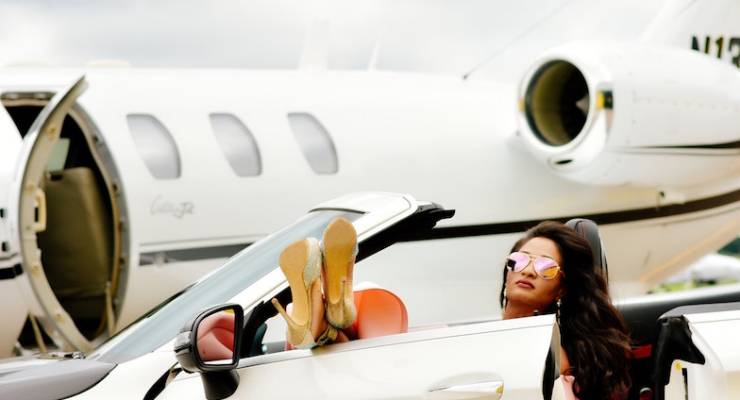
In the 1926 story The Rich Boy, F. Scott Fitzgerald wrote “Let me tell you about the very rich. They are different from you and me”.
Even though life-threatening viruses, such as COVID-19, don’t discriminate — movie star Idris Elba currently has it — being wealthy does dramatically improve your odds of surviving it.
Higher socio-economic status has always correlated with health, of course. But when it comes to healthcare and transport in a time of coronavirus, being rich can save your life.
A global shortage of coronavirus tests means that only the highest-risk category of patients — those who have been in contact with a diagnosed person or who have recently travelled from overseas — are being tested. But there have reports from the UK that wealthy people are jumping the queue by arranging to have their samples sent outside their own country for testing.
There’s no reason to believe that that is not happening here. And if people do become ill, they stay out of germ-laden hospitals by receiving round-the-clock nursing at home.
All of this can be arranged by medical concierges, a new breed of healthcare practice that we imported from the US a few years ago.
Have you tried to get a doctor’s appointment lately? At a concierge practice, you are guaranteed same-day or next-day appointments, 24/7 phone contact and more. Practices charge a monthly or annual fee, which enables the business to take on far fewer clients and thus render a higher standard of service than your local overworked GP.
A slightly different model is employed by healthcare professionals Dorothy Kamaker and Alicia Dunn, who own Patient Advocates Australia (PAA). They take a very active role in patient care by organising medical appointments and accompanying the patients to them, then managing all aspects of their treatment. They also assist families in navigating Australia’s extremely complicated aged-care system.
Kamaker, a former ICU nurse, said that most of their current clients are having ongoing treatment for serious illnesses and/or are older — both these groups are much more at risk in a pandemic.
As well as organising specialist appointments and access to single rooms in private hospitals, PAA can make sure that their patients are first in the queue for any radiology or pathology appointments, she said. This avoids the wait in crowded anterooms and ensures clean equipment.
The practice, which charges a variable hourly rate, also facilitates videoconferencing with healthcare professionals, which saves the patient having to leave home.
And if you want to replicate the hospital experience in your own home, PAA can organise to hire or buy a hospital bed and equipment. For this, the sky is the limit, assisted by 24/7 nursing which would cost between $190,000 and $250,000 a year. The agency also organises home visits by hospital-based professionals such as physiotherapists and occupational therapists.
Could an acutely-ill patient set up their own ICU at home, thus avoiding the hospital system entirely? I asked Kamaker.
“For a price, you can find everything,” she replied.
The other area of crucial difference is travel. High net worth individuals are currently chartering aircrafts in order to avoid flight restrictions and having to travel on bacteria-laden commercial aircrafts.
Barry Graham is the owner of aircraft charter service JetCorp Australia, which has been providing aircraft and helicopter charters since 2006. In the past two weeks, as more and more countries close their borders and restrict the entry of planes from certain countries, the number of enquiries has risen dramatically, he said.
“Lots of people want to get off ‘RPT’ [regular public transport] to minimise the risk of infection,” he said.
One of the largest groups of people currently chartering aircraft are European-based Chinese who are trying to get home, he said.
Previously, Graham was sending planes to Taiwan and Hong Kong, from where passengers were travelling into China. But now that these two countries are closing their borders, he is looking to find space in Bangkok and Tokyo. A flight from western Europe to an Asian airport close to China would cost around $US290,000, he said.
“The difficulty is that for Australian crews, if they go anywhere, they can’t overnight there because they would have to go to a hotel and be quarantined for two weeks. They can only do one-way trips where they turn around and come home immediately. It’s useless having aircraft available if we can’t crew them,” he said.
Charter flights are an excellent way to travel because security is much faster; about 15 minutes for a domestic flight, he said. International travellers go to a Fixed Base Operative – a kind of private terminal – where Australian Border Force processes take about 30 minutes, provided certain conditions are met.
Graham is also organising domestic charter flights for companies who want to keep their employees away from any COVID-19 bugs on commercial planes — flights from Melbourne to the Gold Coast can cost from $32,000 to $41,000 for a 6-8 passenger seat corporate jet; Melbourne to Cairns ($35,000 for a five-seater). For this, customers get a cleaned and disinfected aircraft plus food and beverages, he said.
Announcements of shutdowns this week from Qantas and Virgin had led to an uptick in inquiries at Jetcorp, he said.
“People who absolutely must travel, if they can afford it, are looking much more seriously at chartering flights,” he said.
Overseas, people who cannot quite afford private jets are paying for access to private airport lounges to avoid the risk of interacting with large numbers of the travelling public. There, clients are given their own suite where check-in, customs and security are all done privately before they are taken to the doors of the aircraft.
Of course, if the rich are self-isolating at one of their homes, what are they eating? Do they have to give up eating at top restaurants?
Short answer, no. Spago, legendary chef Wolfgang Puck’s flagship restaurant in Beverly Hills, has added an abbreviated take-out menu for the first time in its 38-year history. San Francisco’s Michelin-starred restaurant The Morris is also adding takeaway, offering it’s signature smoked duck with root vegetables and honey espresso duck jus.
Let them eat cake.








A simple way to help survive the virus crisis? Stop tax giveaways to the rich!
No method of containing coronavirus avoids the need not merely to reverse the public health sector stringencies of the last few decades, but to increase ICU capacity at least four-fold.
Unless the coronavirus turns out to be a lot more amenable than it is so far proving:
—–“herd immunity” will last no more than a season,
—–, a covid19 vaccine may not be much more than 50% effective,
—– fatality rates will be several times that of influenza, meaning
—– that our public health system needs to allow for substantially higher hospitalisation and higher death rates than currently.
Private health is currently contributing nothing extra to the treatment of covid19 patients. Health insurer Bupa recently used images of toilet paper shortages in advertisements to push their private health cover by playing on people’s anxieties over the COVID-19 coronavirus. Bupa removed the ad after Choice noticed it.
So it all needs a lot more public money, regardless. We need to repeal the $50 BILLION a year in tax cuts planned from 2024!
You forgot the ultimate isolation technique of the mega-rich. “Captain, sail the yacht to the shores of a deserted tropical island. Oh, and please load lots of Dom Perignon on board before we sail”.
” F. Scott Fitzgerald wrote “Let me tell you about the very rich. They are different from you and me”.” to which Hemingway is said to have replied, “Yeah, they have more money”.
Not least because they spend heaps on tax avoidance, aka evasion – let’s call it what it is.
Taxes buy civilisation which is why the US is a shithole for the majority of the population, to which our ruling clique – both “sides” – is pushing us.